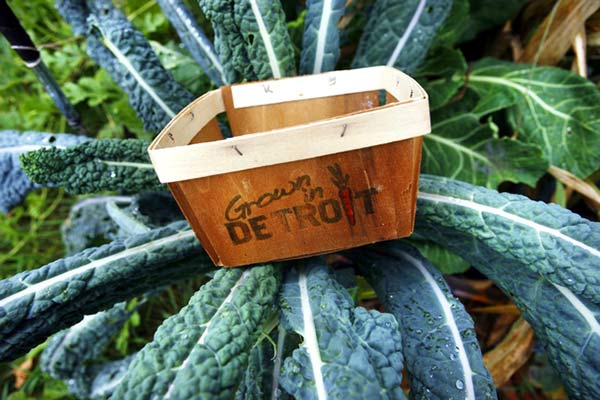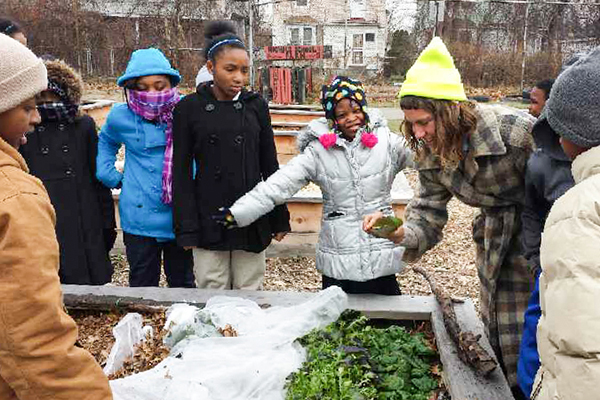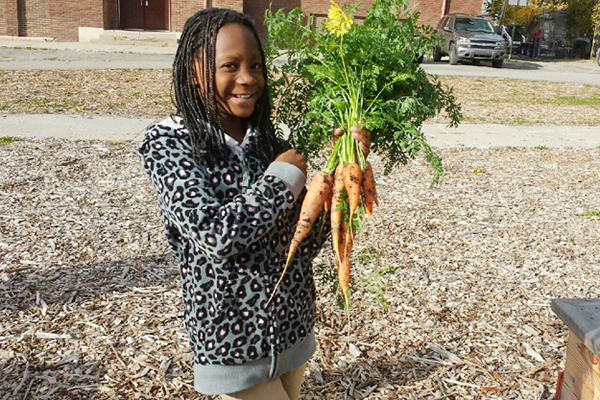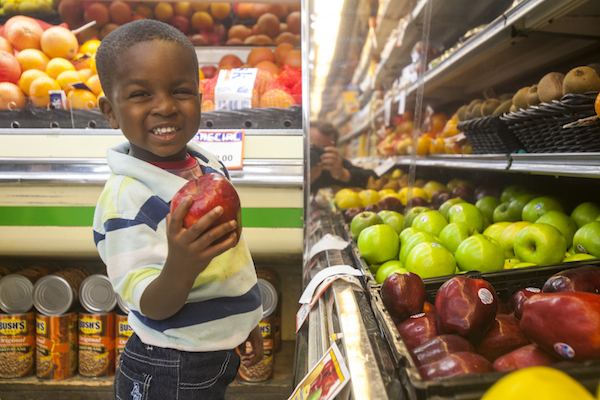Fighting food insecurity in Detroit
September 23, 2015
Source: Model D
Author: Melinda Clynes
When a child becomes unhealthy early in life, everyone shoulders the burden – the wealthy and the poor, the black and the white, you and me.
The child herself could be faced with chronic issues related to being overweight or malnourished: sickness, poor school performance, missed school days, low self-esteem, lack of energy, and the list goes on.
These issues have long-term implications for how much a young person will contribute to society – or deplete from the public coffers. In short, society pays for the cost of hunger and food insecurity.

Photo by Marvin Shaouni
Food insecure children are 31 percent more likely to be hospitalized. Total health costs for obese children (child food insecurity is associated with the risk of obesity because low-nutrient food is cheap and readily available) are more than 200 percent higher than an average child's health costs (No Kid Hungry Report, June 2015).
And while free or reduced-price school lunch programs assist with nutritional needs for older youth, that's often too late to impact a developing child.
This story looks at how Michigan programs and their Detroit counterparts are working to ensure our youngest eaters are putting wholesome and healthy food into their bodies.

Photo by Marvin Shaouni
Farm to early childhood gets broccoli onto the highchair
MSU's Center for Regional Food Systems is playing a huge role in getting good food to children in their early years. It recently released "Farm to Early Childhood Programs Step-by-Step Guide," which outlines in detail how to bring fresh, Michigan-grown food into childcare and preschool programs so that kids can develop good eating habits from the get go.
Its focus is young children, from infants to 6-year-olds – the kids you'll find at home day cares, Early Head Start and Head Start programs, and other private or faith-based child care facilities. Along with showing how to create bridges between farmers and institutions to bring wholesome food onto pint-size tables and highchairs, the guide introduces other ways to promote a culture of good eating, such as creating children's gardens or offering learning opportunities around agriculture and local food.
These programs can really make a difference in areas like Detroit, where more than half of all children are living in poverty.
"People living in high poverty areas face so many real and pressing challenges every day, and families may have difficulty in just getting enough food for everyone for the day or for the week," says Colleen Matts, farm to institution specialist with the MSU Center for Regional Food Systems. "Institutions like early childhood programs and schools serve as reliable sources of good food for vulnerable children in these areas."

Photo by Marvin Shaouni
The MSU CRFS has been tackling issues and challenges of school-aged eaters for a long time, but the farm to early childhood movement is a new pursuit.
"Farm to School in early childhood programs is just in the beginning stages, but we're learning from some of the early childhood programs in our MI Farm to School grant program about the opportunities unique to this arena," says Matts. "From our experience so far, it seems that education connections are ripe and food purchasing and menu planning are a bit more flexible than for school food programs."
The smaller program size, too, lends itself to purchasing locally at farmers' markets or through farm share programs.
Backing the statewide movement locally is the Detroit Food & Fitness Collaborative, a group of 40 organizations developing ways to ensure that everyone in Detroit – especially the most vulnerable children – has access to affordable, healthy, locally-grown food, as well as opportunities to be physically active. Detroit is one of nine communities across the United States selected by the W.K. Kellogg Foundation to institute community change in the areas of food, health, and fitness.
According to W. DeWayne Wells, project director for DFFC, the Schools Work Group of the collaborative is putting a major focus on replicating the good food practices used by Detroit Public Schools to the prekindergarten setting. DPS Office of School Nutrition currently sources 22 percent of its food from Michigan, is bringing more Michigan-grown produce into the lunchroom, is striving toward "clean label" foods (free of dyes, trans fats, corn syrup, stabilizers, etc.), and operates 72 school gardens.
"We're working to identify ways to spearhead, track, and support good food in early childhood settings and promote healthy first foods for infants," says Wells. The term "good food" describes food that's healthy, green, fair and affordable.
Members of the group hail from the Ecology Center, MSU Center for Regional Food Systems, Keep Growing Detroit, Black Family Development, and Detroit Public Schools. Betti Wiggins, executive director of DPS Office of School Nutrition and co-chair of the group, has garnered national attention for her work in bringing healthier food to students. She wants to see the good food movement make it down to the youngest learners.
"I believe we all really want to change the food system," says Wiggins. "If the school district can't promote that, who will?"

Photo by Marvin Shaouni
It's not hard to argue that bringing fresh food to children in preschools and daycares makes sense; young children's brains are more susceptible to developmental problems if their environment is impoverished or deprived. But how do we then make sure that families have access to healthy food so that children don't go home to a house full of nutritionally void snacks, meals, and beverages?
Incentivizing healthy choices for young families
In terms of healthy food access, the opportunities are growing in Detroit: neighborhood farm stands and farm markets present options throughout the growing season; Whole Foods in Midtown has brought alternative options to surrounding neighborhoods; and the city's two Meijer stores have huge produce departments and many organic options.
But it is Double Up Food Bucks (DUFB) that is proving to be one of the best options for local families. The statewide healthy food incentive program, designed by Fair Food Network, matches the amount of SNAP (food stamp) purchases made at farmers markets with additional dollars to spend on fresh, regional produce. So a family that spends $10 in SNAP benefits receives an additional $10 in DUFB to buy Michigan-grown fruits and vegetables.
The program has now expanded to grocery locations; DUFB can be used at 10 Detroit markets, including Glory Supermarket, Imperial Fresh, Lafayette Foods, and Old Redford Food Center.
Incentivizing healthy purchases – versus limiting choice by penalizing unhealthy purchases – through programs like DUFB is hugely successful. A whopping 93 percent of participating SNAP users at farmers markets report eating more fruits and vegetables because of the program. Just as important, 83 percent report buying fewer low-nutrition snacks.

Photo by Marvin Shaouni
More than half of DUFB customers have children living in their households, and of those, nearly 40 percent have children from newborns to five-year-olds. The program has been so successful, Fair Food Network was recently awarded a $5.1 million USDA grant to expand DUFB across the state, and FFN will be helping to launch Double Up programs in other states.
Access and education: the nutrition must-haves
For young families with transportation barriers who still may be challenged getting to a farmers market or a store with fresh produce, mobile distribution sites provide a solution.
The Food Bank Council of Michigan, with funding from the Michigan Health Endowment Fund, runs a statewide program, Michigan Food Bank Access to Nutrition, that delivers fruits and vegetables to families in need through a system of mobile distribution sites. Food banks, like Gleaners Community Food Bank in Detroit, execute the deliveries, getting upwards of 20 pounds of produce into the kitchens of local families at each mobile distribution.
But access in and of itself does not solve the problems of child malnutrition, family food insecurity, or child obesity. If a parent receives a bunch of kale but does not know how to prepare it, that food goes to waste and that nutrition does not help developing children. The latest iteration of MI-FBAN recognizes this and is incorporating cooking demonstrations and nutrition education into mobile distributions across the state.
Cooking Matters is another program with impressive results. It's a six-week, hands-on food purchasing and preparation course where low-income families learn how to eat healthy on a budget. Gleaners administers the program locally and is helping to expand the program across Michigan's Upper and Lower peninsulas. Cooking Matters sends volunteer chefs and dieticians into communities to teach a prescribed six-week course designed by Share Our Strength, a national organization dedicated to ending childhood hunger in America.
Results for Cooking Matters are remarkable, with graduates showing measurable increases in fruit, vegetable, and whole grain consumption; more frequent reading of nutrition labels; and better meal planning. Along with other southeast Michigan locations, Gleaners offers the class at Head Start sites to parents of preschoolers, last year working with 10 Head Start sites in Wayne County.
The health impact of getting every parent with children ages six and under into a Cooking Matters course is compelling, with potential to reverse the trend of increasing child obesity and diabetes.
Another way children are set up for a healthy future starts at birth with breastfeeding. Breast milk contains vitamins, minerals, and disease-fighting substances, packing such a powerful punch that the American Academy of Pediatrics recommends exclusive breastfeeding for the first six months of an infant's life.
Here in Detroit, the Black Mothers' Breastfeeding Association, led by founding executive director Kiddada Green, is working to educate new mothers and empower them to breast feed. Green says that getting mothers to breastfeed is as much about acceptance as personal choice. If mothers feel good and are welcomed around breastfeeding, they're more likely to choose it.
"So we're trying to make it more acceptable and doing it from a community-based approach," says Green.
Since brain development is most sensitive to a baby's nutrition between mid-gestation and two years of age (Zero to Three; National Center for Infants, Toddlers and Families), a baby's intake is particularly important.
Detroit is one of three U.S. communities piloting a First Food Friendly Community Initiative. As part of the project, BMBA is surveying Osborn residents to gage sentiments and behaviors around breastfeeding in public. It will eventually create a curriculum and launch an educational campaign, with community members being trained to engage businesses, churches, and other organizations in making the city a First Food Friendly environment.
Green is a lead consultant on the project. "Just like it's important to have accessible fruits and vegetables that are available in the community…it's also important to make sure breastfeeding is acceptable," she says. "If I go to the laundromat, or I'm at a park, or I go to the grocery store and I need to breastfeed, it's accessible to me because it's welcome here."
Making good food more affordable
Along with the acceptability of breastfeeding and the accessibility of healthy food comes affordability.
Linda Campbell is an expert in food justice. She works with Gleaners' client choice pantries in Brightmoor and the North End of Detroit, overseeing nutrition education, cooking, gardening, and food justice programs. Target participants are parents with children under the age of six, and the emphasis is on healthy, whole foods.
Campbell says that while there is a growing awareness among low-income families about the need to cook and eat healthy, they are often very limited by cost.
"Accessibility and affordability are getting in the way of our families being able to eat more healthily – not the desire. They're willing to learn new ways to get great food and prepare it," says Campbell.
Campbell sees a lot of families with children who not only are coming to the pantry wanting to feed healthy food to their children, but also are willing to think differently about food. "To do that in terms of money in their pocket, that's the challenge. It's an economic challenge for our families, not an education and awareness challenge."
With limited resources, income and inequality can define not only where a child lives, but how he eats. Young children in Detroit, a majority of whom are African American and live below the poverty line, are at particular risk.
"Because African American children zero to five are disproportionately burdened by poverty, you're going to see those disparities show up in those households," says Campbell. Lack of good food is often compounded by an absence of safe public parks to play outdoors or no space in the home to exercise, makes growing healthy children even harder for many Detroiters.
As Joel Berg stated in his 2008 book, "All You Can Eat: How Hungry is America?", obesity among low-income Americans alone should motivate us to identify and put a stop to it. "Certainly one huge step toward addressing this spreading obesity epidemic would be to make sure that poor Americans around the country have better access to more affordable, nutritious foods," notes Berg.
Campbell, too, believes that the solution lies in building more capacity to produce healthy, whole foods in our communities – to scale up a food system that is locally sourced and affordable for families.
It makes sense.
"Good food helps kids learn," says Matts of MSU CRFS. "By introducing good, fresh, local foods to kids early in life, we may shape their eating habits and, later in life, their buying habits, so that they reach for that tasty Michigan apple, blueberry, or tomato well into the future, to benefit both their health and our farmers."
This story is part of a series of solutions-focused features and profiles about the programs and people that are positively impacting the lives of Michigan kids. The series is produced by Michigan Nightlight and is made possible with funding from the W.K. Kellogg Foundation.
First posted at Model D on September 8, 2015.







